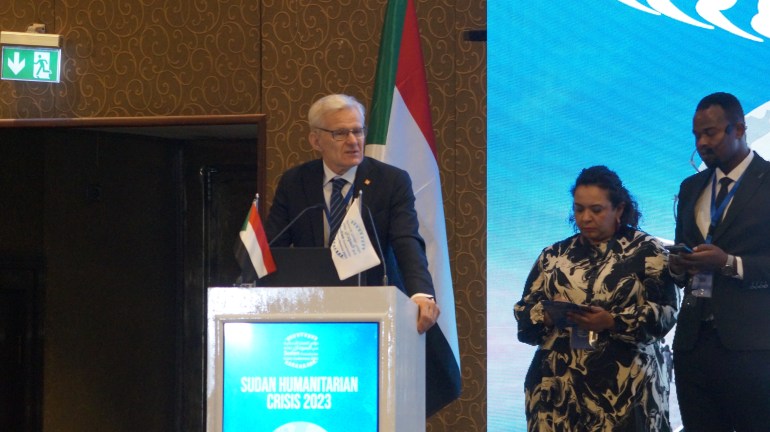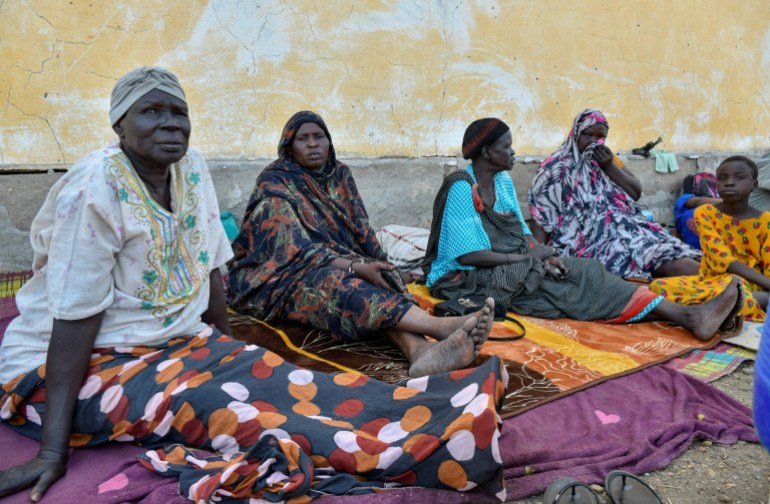Cairo, Egypt – A large gathering of international and grassroots aid organisations working in Sudan has met to discuss the increasingly desperate needs of people on the ground as the armed conflict continues to take lives and displace hundreds of thousands – as well as how to work together more effectively.
International organisations need to communicate and coordinate more effectively with local groups, Mawada Mohammed, head of psychological rehabilitation and community development organisation Ud, in Khartoum, told Al Jazeera at the Sudan Humanitarian Crisis Conference in Cairo (November 18 to 20).
She said this “lack of coordination among themselves and between them and governments or international organisations” is one of the greatest challenges local groups face.
CEO of diaspora-led humanitarian organisation, Shabaka, Bashair Ahmed told Al Jazeera: “Local responders should have a voice in high-level policy and advocacy … they must be provided with the tools and skills to do so, and not just invited to be dressing.”
Kidnap, rape and assault
Since the Sudanese Rapid Support Forces (RSF) began a military campaign to seize control of Khartoum on April 15, more than 10,000 people have been killed and at least six million displaced due to the heavy fighting that has spread through most states.
The head of the World Health Organization warned that the conflict in Sudan is having “a devastating impact on lives, health and well-being”, as aid agencies raised the alarm that their Sudanese workers are being kidnapped, raped and assaulted.
In a speech to the conference, Tedros Adhanom Ghebreyesus said nearly 700 million Sudanese children suffer “severe, acute malnutrition” and the country’s beleaguered healthcare system is nearing “a breaking point”.
Dr Abubakr Bakri, operations manager for Eastern Africa at Doctors Without Borders (Medecins Sans Frontieres, or MSF), called for humanitarian workers to be provided with security.
MSF staff have endured beatings, death threats and theft during the past months of the conflict, he said. He added that violence and threats were mainly directed towards MSF’s Sudanese staff, a point echoed by other NGOs at the summit, who said female local staff have also been kidnapped and raped.

Aid organisations said they are unable to reach places where people need the most assistance due to fighting and blockades, and warned that local workers are in increasing danger.
Experts from NGOs highlighted that more than half of Sudan’s population – 25 million people – are in urgent need of humanitarian assistance and the medical situation is critical, with 70 to 80 percent of all hospitals out of service across the country.
At least seven areas have come under siege by the RSF in Khartoum alone, Mukhtar Atif, a volunteer for the Emergency Response Rooms, said. Other areas away from the capital have been completely cut off by fighting, rendering the arrival of humanitarian supplies impossible, he added.
“There is a mounting difficulty in providing humanitarian assistance to citizens who find themselves in conflict zones,” Mohammed Salah, a Sudanese activist and member of the Emergency Lawyers group, told Al Jazeera.
A call for humanitarian corridors
Salah joined the conference in Cairo after more than 48 hours of travelling from Gezira State in Sudan, where he has been staying since his home in Khartoum was overrun by fighting. He said the 1,020km (634-mile) journey to the airport at Port Sudan was full of checkpoints operated by the Sudanese Army, at which all passengers were searched and interrogated.
The checkpoints operated by both RSF and Sudanese Army forces pose a significant obstacle to the movement of people and goods, making humanitarian responses to urgent needs extremely difficult, experts said.
International relief organisations, including conference co-organiser the Norwegian Refugee Council (NRC), called for the creation of humanitarian corridors to enable aid workers to assist those in need.
NRC’s Secretary-General Jan Egeland said aid and staff convoys were not being allowed to perform their humanitarian duties, especially in the areas that are suffering the most due to the raging conflict – Khartoum and Darfur.
“Unfortunately, there is no way to put pressure on the warring parties to force them to open safe corridors and paths. We continue to urge them to do so but without success,” Salah said.

One month ago, MSF announced that it had been forced to suspend life-saving surgical activities at the Bashair Teaching Hospital in south Khartoum because of the military blockade on supplies.
Aid officials and experts said, however, that nothing can be achieved without political and diplomatic efforts. Lawyer Mohammed Salah said: “The international community must put pressure on the warring parties to put an end to this human suffering and war.”
As NRC’s Egeland noted when he opened the conference, there is no “humanitarian solution for a horrific war”.
“There are political and diplomatic solutions for the war and for the rebuilding of the country, accompanied by humanitarian assistance.”









